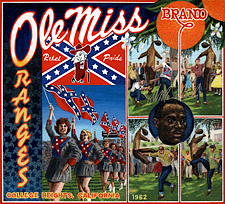
In response to both Pauline Hopkins’ “As the Lord Lives, He Is One of Our Mother’s Children” and Claude McKay’s poem “Outcast”, I explore the very perplexing question that I have myself struggled with for what seems to be the entirety of my life post adolescence and discovering who I am/want to be. My question is by taking on the character and persona of a very 21st century westernized, American girl, and ultimately suppressing my “out of Africa black” roots in this country and all the weight that goes along with it, am I wrong to do so? I was originally born in a very small town in Mississippi, but I moved to Texas when I was only a month old so really I consider Texas my home. Both my parents are from and grew up in that small Mississippi town and so did my grandparents and their parents. We go back and visit this town, frozen in time it appears, nearly once a year, every year. The setting in which Hopkins describes the gang of white men and the lynching of Jones, practically the entire story, reminded me very much of this small town and could have easily taken place there. There was one instance that popped into my mind upon reading when my family and I were driving down the town’s main street and saw the KKK with a table set up literally on the side of the road advertising their meeting that week with men dressed in full garb and supportive drivers hooting and beeping along side us. I was only about 9 or 10 at the time but I remember that day so vividly. I am a descendent of slaves no doubt and have had more than my fair share of history lessons on the subject but until that day I’d never experienced the terrible feeling that was probably comparable to only a minute fraction of the emotions my ancestors felt. The riotous way Jones met his maker was definitely a reoccurring event in my hometown, and coming to terms with that fact nauseates me. As a modern day kinda girl, sometimes I want so badly to be able to erase any ties I have to such a horrible place where even more unbearably horrific things happened. The more my family and I went back there, the more I would mentally and emotionally distance myself from it and all that it means: my slave blood, murderous people, the wilds of Africa, etc. Much like McKay’s “dim regions from whence my fathers came/ My spirit [was] bondaged” by the slavery stained history of not only my family, my place of birth, but of me. I yearn so badly to escape the chains of who I am historically and fully submerge myself into “the great western world” and “never hope for full release” of all that the seemingly more blended American world has for me.


